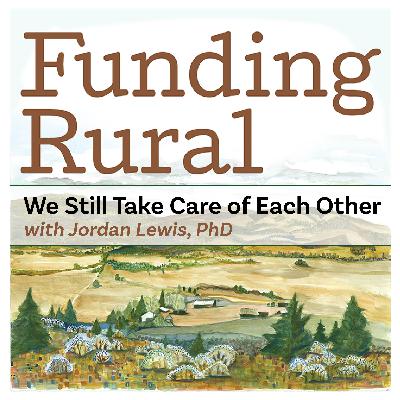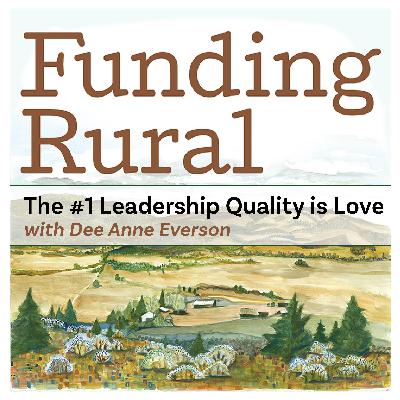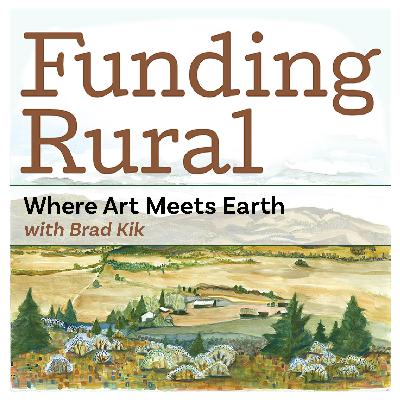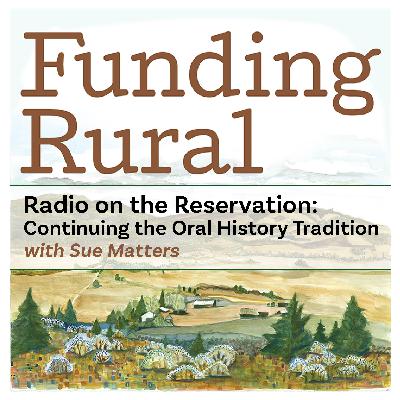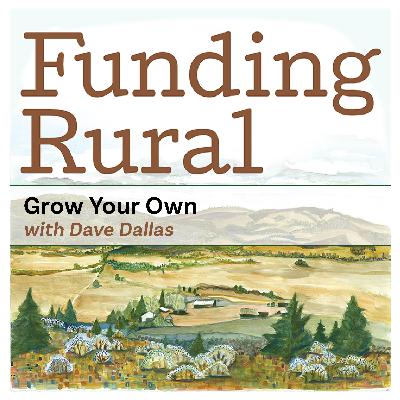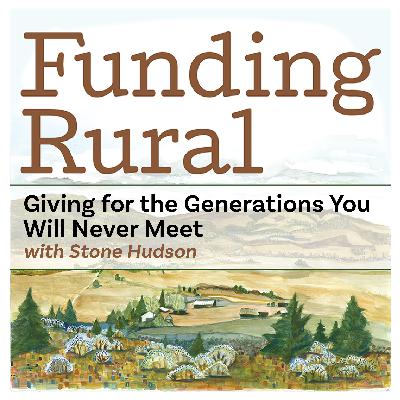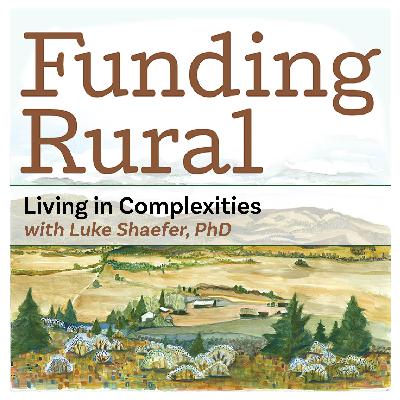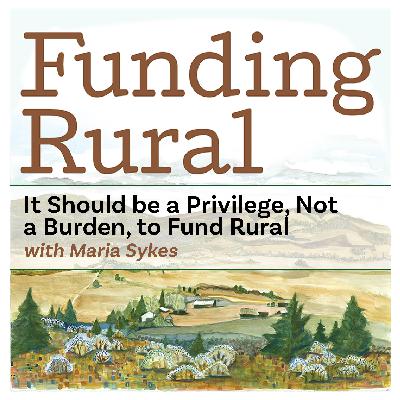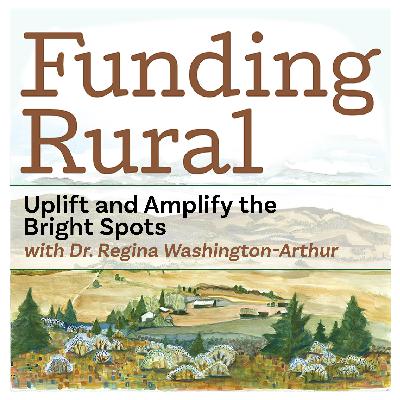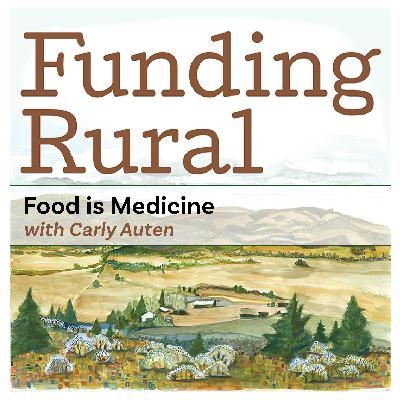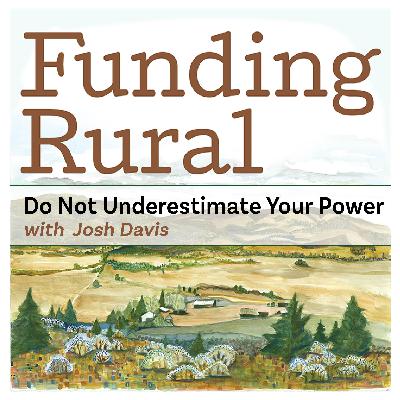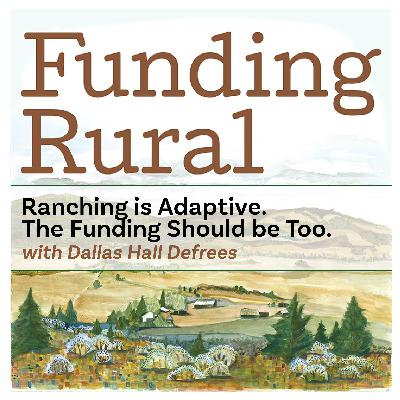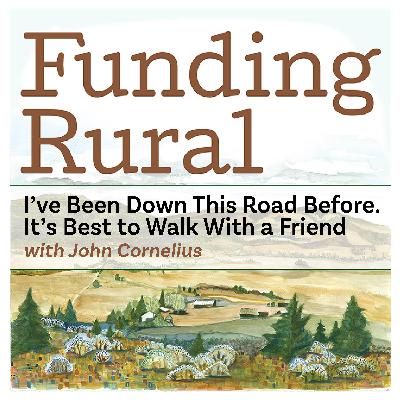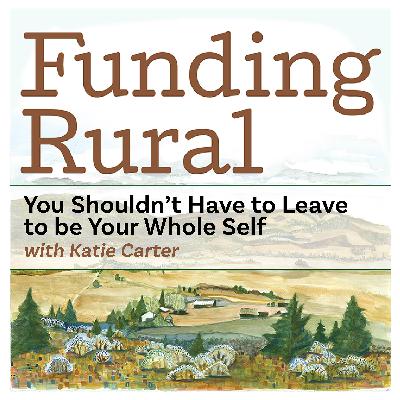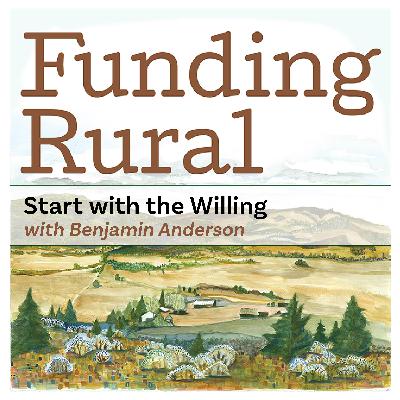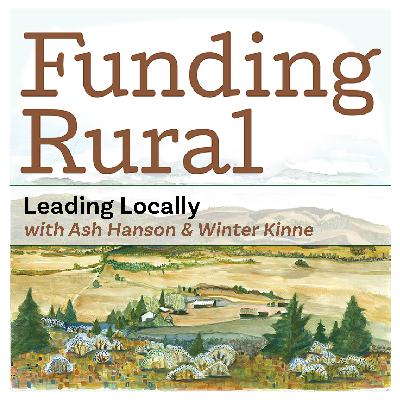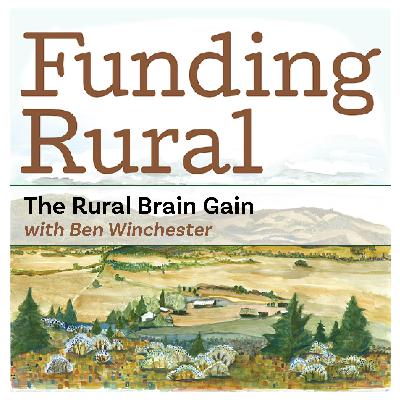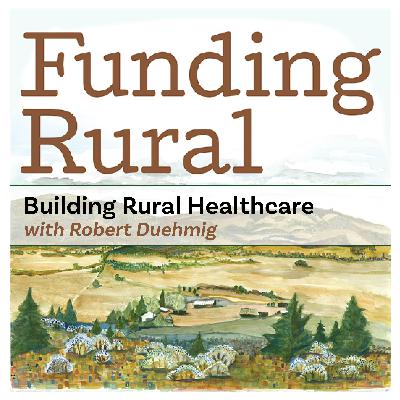Discover Funding Rural
Funding Rural

Funding Rural
Author: Roundhouse Foundation
Subscribed: 9Played: 94Subscribe
Share
© Roundhouse Foundation
Description
Funding Rural: A podcast that explores how philanthropy can better serve rural and Indigenous communities. Join host Erin Borla, Executive Director of the Roundhouse Foundation in Sisters, Oregon, as she engages with folks on all sides of philanthropy to better understand the challenges and opportunities facing funders and the folks they hope to serve and support.
57 Episodes
Reverse
There are so many folks who want to age in place but live far away from the care they need, and that can present challenges for their health, happiness and the social fabric of their communities. Dr. Jordan Lewis is the director for the Center on Aging at the University of Hawaii at Manoa with the Thompson School of Social Work and Public Health. He’s Alaska Native on his mother’s side and got his PhD in Community Psychology from the University of Alaska Fairbanks. Over the course of his career, Jordan has been drawn to the study of elder care— especially in rural and American Indian/Alaska Native communities. He wants to study the ways in which people can “age how they wish” and what we can all learn from the elders who are navigating that chapter of life.
When massive wildfires swept through Oregon in 2020, Dee Anne Everson helped hundreds of people who had just lost everything, and five years later, she’s still helping them. She’s CEO of United Way of Jackson County Oregon, and has a special leadership philosophy that’s evident in her work. Everson leads a staff of 7 and they partner with hundreds of volunteers across south-central Oregon to help folks with everything from transportation issues, senior needs, and emergency cash support for things like car repairs or utility bills. They’ll even help you prep your taxes.
Crosshatch Center for Art and Ecology in Northern Michigan is an artist residency that aims to build community through farming, ecology and economy. The Northern Michigan Small Farms Conference is a program of theirs that brings farms together to learn and connect in the height of summer. Led by Brad Kik and his wife, Amanda, Crosshatch was also a key partner behind a recently completed new building near downtown Traverse City called The Alluvion that serves as a performance center, co-working space, and also provides affordable housing. Kik shares his fundraising experiences for both Crosshatch and The Alluvion, and offers a perspective rooted in place and purpose.
Philanthropy has long been a champion of public radio, providing grants for everything from infrastructure and new buildings to special reporting projects. Recent federal cuts have made philanthropic support even more critical to keep public radio stations afloat: across the country, in rural and remote areas, and especially on Tribal lands. Sue Matters is the station manager at KWSO 91.9 FM, which is a non-commercial radio station that is licensed, owned and operated by the Confederated Tribes of Warm Springs in Oregon. She shares her experience, spanning nearly 40 years, on the reservation’s radio and what the station means to the culture and well-being of listeners.
In rural and remote Oregon, where populations are low and the need for educators is high, there’s Rural Teacher Corps, a Grow Your Own program that is implementing new approaches to identifying, supporting, and training tomorrow’s teachers. Dave Dallas, who runs the program, teaches in the College of Education at Eastern Oregon University and he’s the Director of Teach Rural Oregon. He shares how philanthropy can play a key role in meeting some of the overlooked needs in rural education.
Native American Tribal communities are a blind spot for philanthropy with just .4% of funding going to Native organizations—but some philanthropic organizations are trying to change that. Stone Hudson, a citizen of the three affiliated tribes (Mandan, Hidatsa and Arikara) of the Fort Berthold Reservation in North Dakota shares his experience as Program Officer at Meyer Memorial Trust where he oversees the Tribal Nations Partnership Initiative. His sense of service, stewardship and curiosity is magnetic, and he knows how to show up authentically and bring people together in the process.
Luke Shaefer, PhD is one of the nation's foremost scholars of poverty and social welfare policy. He is a professor at the University of Michigan and is the inaugural director of Poverty Solutions, an interdisciplinary initiative that partners with communities and policymakers to find novel ways to alleviate poverty. In 2015, he co-authored the book, “$2 a Day: Living on Almost Nothing in America”, which was named one of the 100 Notable Books of the year by the New York Times Book Review. In Flint, Michigan, Luke helped launch RX Kids, the nation’s first citywide cash prescription program designed to help ease the financial journey into parenthood.
Green River, Utah (population 900) can be seen as a waypoint in the desert with more hotel rooms than residents. Or it can be seen through the eyes of locals like Maria Sykes. She’s the director and co-founder of Epicenter, a nonprofit in Green River that focuses on housing and fosters creativity and art in the community. Maria did not grow up in the region, instead she came by way of Americorps, and in the 16 years she’s lived in Green River, she’s contributed to its vibrancy, livability, and iconic neon signs.
Libraries are vital to rural communities—they do so much more than just check out books. They provide internet access, heating and cooling centers, early learning, nutrition, STEM programs, story time and more. Dr. Regina Washington-Arthur is the managing director of the Rural Library Network for Partners for Rural Impact. With a background in public health, Washington-Arthur explains that libraries contribute to the overall health of a community; they are a critical component of the cradle-to-career educational pathway; and more often than not, they do so with limited financial resources.
More than 50 million Americans face food insecurity. And in the U.S., 9 out of the 10 counties with the highest rate of food insecurity are rural. To offset this disparity, Roundhouse Foundation recently launched a 6 million dollar investment which will support local food purchase over the next three years. Carly Auten is food program director at NeighborImpact, a grant recipient that distributes more than 4 million pounds of food every year and feeds 80,000 people across Central Oregon every month.
Gretchen Guess is president and CEO of the Rasmuson Foundation in Alaska, where 80% of the population lives in remote areas without road access. Gretchen has lived there all her life and served terms in both the Alaska House of Representatives and Senate. She’s brought her public service experience to Rasmuson Foundation, which is one of the largest funders in Alaska and centers the community in all of their grantmaking.
Josh Davis began his career in the nonprofit world by working for the Delta Health Alliance, which is a nonprofit that works to improve access to healthcare and education in the Mississippi Delta. He then made the shift into the philanthropic world and now serves as the vice president of policy and partnerships at StriveTogether, leading national efforts to build civic infrastructure and influence public policy that puts more young people on a path to economic mobility.
Farming and ranching requires experimentation, adaptation, and innovation. It’s a whole lot of problem solving done by people who often don’t have a whole lot of expendable capital. That doesn’t mean that ranchers aren’t deeply committed to stewarding the health of their land for generations to come. Dallas Hall Defrees is a 5th generation rancher in Eastern Oregon who serves as the director of Regenerative Ranching with Sustainable Northwest. She works with ranchers who are actively trying to improve the biodiversity, soil health and wellbeing of their livestock while making a living.
John Cornelius grew up on the Pine Ridge Reservation in South Dakota; he served in the US Army; and he has the national suicide helpline number, 988, tattooed on his arm. He is a peer support and suicide prevention specialist and a mental health educator who walks the talk. John has overcome addiction, suicide attempts, and periods of houselessness and says his faith guides him as he helps others facing crisis. This episode delves into mental health topics and suicide prevention. If you or someone you know are experiencing thoughts of suicide, call or text the national helpline at 988.
How much is philanthropy currently investing in LGBTQ organizations? Not a whole lot, especially in rural. Katie Carter is the CEO of Pride Foundation, which was founded 40 years ago to support Gay, Lesbian, Bisexual, Transgender and Queer folks. Pride currently works in the Northwest, providing support to nonprofits in both urban and rural places. Katie grew up rural and recognizes the importance of being your authentic self, no matter where you live.
Healthcare is top of mind for many Americans, and in rural communities, where there are distinct challenges, there is also hope in new ideas and solutions. Benjamin Anderson is president and CEO of Hutchinson Regional Medical Center in Hutchinson, Kansas and he sees the nonprofit hospital system he runs as a nexus that sends ripples of health into the community as a whole. And he puts that community at the center of everything the organization does.
Episode recorded live in Minneapolis-St.Paul on June 11th, 2025 at the Council on Foundations’ nonprofit funders conference, Leading Locally. Ash Hanson of Department of Public Transformation and Winter Kinne of Community Foundation of the Ozarks took the plenary stage for a conversation about funding the urban-rural connection with show host, Erin Borla.
Funding Rural is coming back this fall, starting on September 23, 2025 and we can't wait to share the new episodes. Your host, Erin Borla of The Roundhouse Foundation in Sisters, Oregon has been talking with a lot of change agents, steadfast funders, and proud rural advocates in preparation for this season. We think you'll enjoy their perspectives and hope you'll stick around for all the third season episodes. Be sure to head over to our hub, FundingRural.com, for more information.
Narrative plays a critical role in what funders support, and unexamined narratives can create unintended consequences. We often hear about the brain drain in communities as young talent leaves, but Rural Sociologist Ben Winchester offers facts around an alternative narrative—the brain gain— a demographic that is moving back into rural communities. Ben works in the Department of Community Development at the University of Minnesota Extension and he’s fascinated by all things rural.
Across vast stretches of rural America and particularly in the West, emergency care—or even basic routine healthcare—can be hard to come by. People drive hours for eye exams, to give birth, have their teeth cleaned, or get therapy. Robert Duehmig, director for the Oregon Office of Rural Health, works towards solutions that fit rural and remote communities in Oregon. He discusses what’s working, what needs work, and how philanthropy can support healthcare in these communities.


